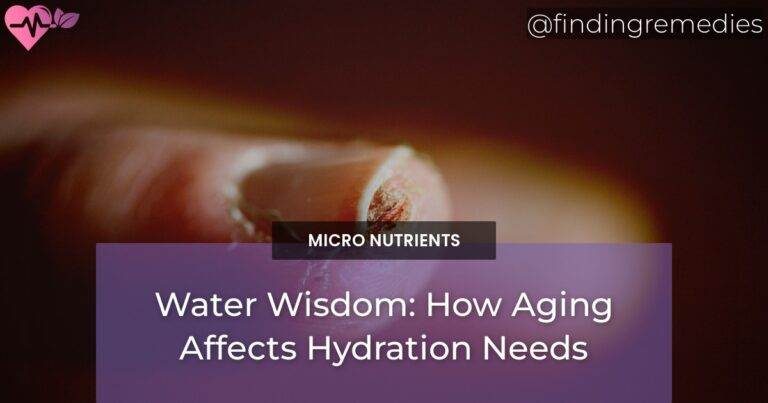Aging is a natural part of life that brings about many changes in our bodies. As we get older, our nutritional needs also change, and one crucial aspect of this is our hydration needs. While it may seem simple, hydration is a vital part of our overall health and well-being. In this article, we will explore the impact of aging on hydration needs and how we can properly adjust our fluid intake to maintain proper hydration levels. We will also discuss the signs of dehydration in the elderly and identify nutrient-rich foods that can support healthy aging. So, let’s dive into the world of water wisdom and learn how to stay hydrated as we age.
Table of Contents
Basic Principles of Balanced Nutrition
Before we delve into the specifics of aging hydration, it’s essential to understand the basic principles of balanced nutrition. Our bodies require a balance of essential nutrients to function correctly, and our diet plays a crucial role in providing these nutrients. A balanced diet includes a variety of fruits, vegetables, whole grains, lean proteins, and healthy fats. It’s also essential to limit processed and high-sugar foods, as they can contribute to various health issues, including dehydration.
Understanding Food Labels and Ingredients
Reading food labels and understanding ingredient lists can be overwhelming, but it’s crucial to make informed decisions about our food choices. Pay attention to the serving size, as it may be different from the amount you typically consume. Look for ingredients that you can pronounce and recognize, and avoid foods with added sugars and artificial ingredients. Be mindful of the nutrition facts, especially sodium and sugar content, as they can affect our hydration levels.
Meal Planning and Healthy Eating Habits
Meal planning is an excellent way to ensure we are getting the nutrients we need and staying hydrated. Planning meals ahead of time can also help us avoid unhealthy food choices when we are pressed for time. Aim for a variety of colors on your plate, as different colored fruits and vegetables offer different health benefits. Additionally, establishing healthy eating habits, such as eating slowly and mindfully, can help us stay hydrated by allowing our bodies to recognize when we are full and not overeat.
Dietary Recommendations for Specific Health Goals
Our nutritional needs can vary based on our health goals, and this is especially true for the elderly population. For example, if someone is managing a chronic condition like diabetes or heart disease, their dietary recommendations may differ from someone who is healthy and looking to maintain their overall wellness. Consulting with a healthcare professional or registered dietitian can help create a personalized nutrition plan that takes into account individual needs and health goals.
Changes in the Body’s Water Retention with Age
As we age, our bodies go through many changes, and one of them is our water retention. Our bodies are made up of about 60% water, and as we get older, this percentage decreases. Our bodies also become less efficient at retaining water, making it crucial to adjust our fluid intake to prevent dehydration.
Adjusting Fluid Intake
It’s essential to stay hydrated by drinking enough water and other fluids throughout the day. As we age, our thirst sensation may decrease, making it easier to become dehydrated without even realizing it. A general recommendation is to drink at least eight glasses of water a day, but individual needs may vary. It’s also important to note that certain medications, such as diuretics, can increase the risk of dehydration, so it’s crucial to consult with a healthcare professional about fluid intake adjustments.
ALSO READ
Recognizing Dehydration in the Elderly
Dehydration is a prevalent issue among the elderly, and it’s essential to recognize the signs and symptoms. Some common signs of dehydration in the elderly include dry mouth, dark urine, dizziness, fatigue, and confusion. It’s vital to address dehydration immediately, as it can lead to serious health complications, including urinary tract infections, kidney stones, and even hospitalization. Encouraging frequent water breaks and offering hydrating foods, such as fruits and vegetables, can help prevent dehydration in the elderly.
>Can Electrolyte Balance also Affect Hydration Needs as We Age?
As we age, maintaining a proper electrolyte balance becomes crucial for hydration needs. Electrolyte balance and recall boost are essential for supporting hydration, especially among older adults. Decreased sensitivity to thirst and reduced kidney function may further emphasize the importance of electrolyte balance in hydration as we age.
Identifying Nutrient-Rich Foods
In addition to staying hydrated, it’s essential to consume nutrient-rich foods to support healthy aging. As we age, our bodies may require more of certain nutrients, such as calcium and vitamin D, to maintain bone health. Foods like leafy greens, dairy products, and fatty fish are excellent sources of these essential nutrients. Additionally, incorporating more fruits and vegetables into our diets can provide a wide range of vitamins, minerals, and antioxidants that support overall health and well-being.
Conclusion
Aging hydration is a crucial aspect of our overall health and well-being. As we get older, our bodies undergo many changes, and it’s essential to adjust our fluid intake and consume nutrient-rich foods to maintain proper hydration levels. By understanding the basic principles of balanced nutrition, making healthy food choices, and recognizing the signs of dehydration, we can support healthy aging and live our best lives at any age.
RELATED ARTICLES:

